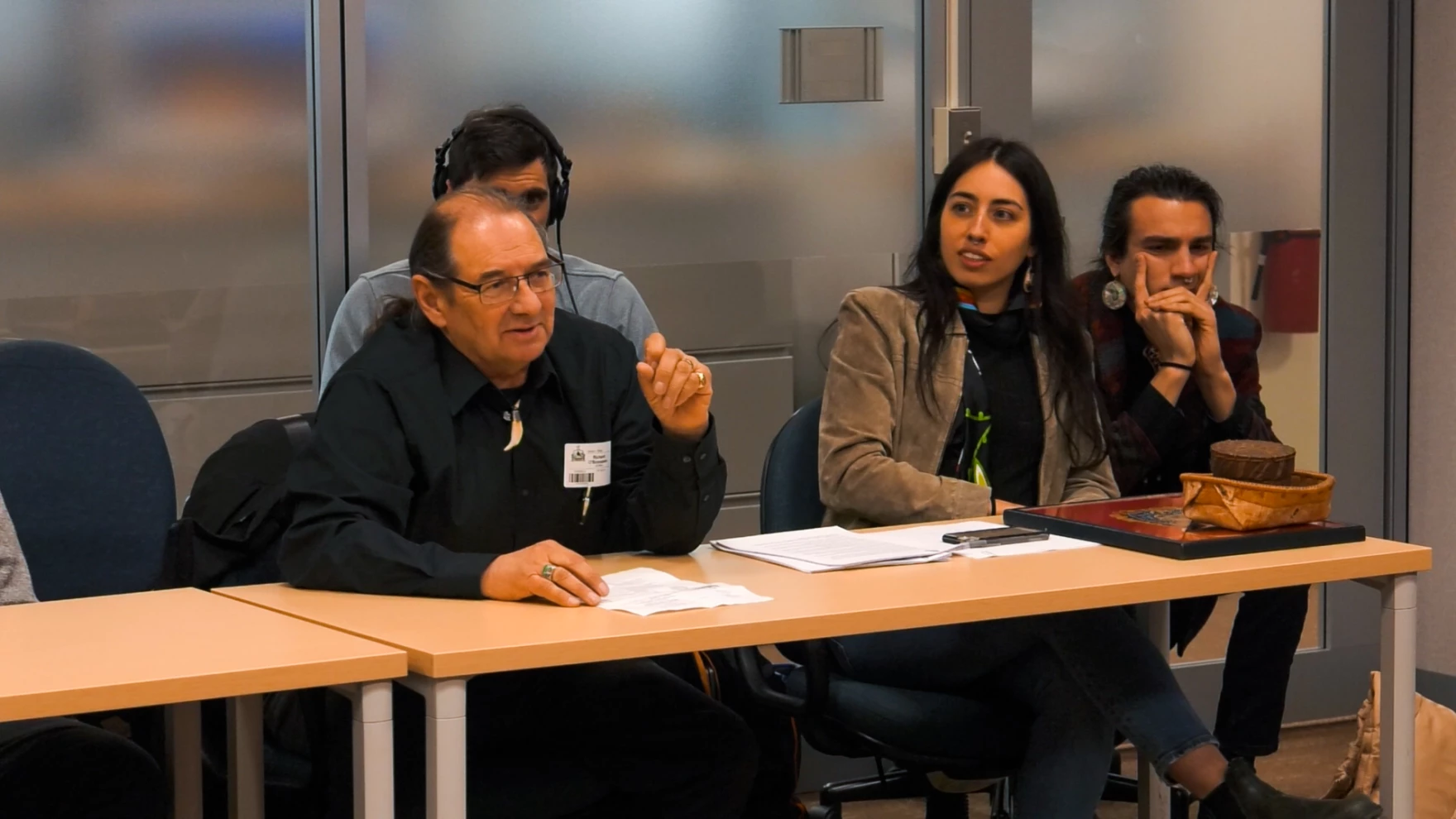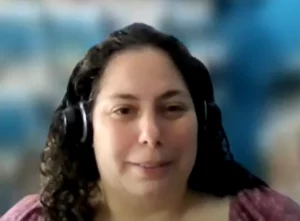As Vermont Truth & Reconciliation Commission begins, Odanak chief repeats request for inclusion

A map at the Musée des Abénakis on the Odanak First Nation reserve shows the ancestral lands of Northeast Native communities pre-colonization. Abenaki territory stretches down from present-day Quebec through Vermont as well as into New Hampshire, Maine and Massachusetts. (Elodie Reed / Vermont Public)
The leader of Odanak First Nation is repeating his request for the Abenaki community’s inclusion in decision-making on Indigenous issues as Vermont’s Truth and Reconciliation Commission gets underway.
The selection panel for the Truth and Reconciliation Commission (TRC), made up of community members, announced the three commissioners on March 31.
As outlined in Act 128, the TRC is responsible for documenting how state policies and laws have harmed and continue to harm marginalized communities, and then recommend how the state can repair these harms.
“[I]ndividuals who identify as Native American or Indigenous” is the first of the marginalized communities named in the state law.
But Chief Rick O’Bomsawin of Odanak First Nation — currently based in Quebec, whose ancestral lands include Vermont — says no one contacted Odanak officials during the TRC selection process.

Odanak First Nation Chief Rick O’Bomsawin speaks during a meeting of the Vermont Commission on Native American Affairs on Wednesday, March 8. (David Littlefield / Vermont Public)
“The biggest disappointment is, we had no information until all of a sudden, here’s the people that are going to be on this,” O’Bomsawin said. “I think we’ve made it very clear — I mean, even to the governor and to all the different commissions in Vermont, and in other states in the U.S. — that when it came to issues of ours, we definitely wanted to be involved, and we definitely wanted to be notified and contacted.”
Vermont Public emailed questions to the TRC selection panel co-chairs, but did not immediately receive responses.
More from Vermont Public: Vermont now has a Truth and Reconciliation Commission. ‘It’s a huge task.’
At the March 31 announcement of the commissioners, selection panel co-chair Karen Tronsgard-Scott said they reviewed nearly 100 applicants.
“We developed, I would call it a matrix, to — that identified the specific qualities of candidates we were looking for,” Tronsgard-Scott said. “And we went through a process — we read every single application — we went through a process of figuring out who were the candidates that seemed to match the charge the best.”
“I think we’ve made it very clear – I mean, even to the governor and to all the different commissions in Vermont, and in other states in the U.S. – that when it came to issues of ours, we definitely wanted to be involved, and we definitely wanted to be notified and contacted.”
Chief Rick O’Bomsawin, Odanak First Nation
As state employees, each commissioner will make an $80,000 annual salary and receive paid time off and benefits. The positions last for three years.
The candidates chosen were Rutland Area NAACP President Mia Schultz; St. Michael’s College professor and state disability community leader Patrick Standen; and Melody Walker Mackin, an artist, educator, member of the Vermont Commission on Native American Affairs and citizen of the state-recognized Elnu tribe.

Melody Walker Mackin speaks virtually at the March 31 event announcing the commissioners for the Vermont Truth and Reconciliation Commission. (Zoom)
At Wednesday’s meeting of the Vermont Commission on Native American Affairs (VCNAA), of which Mackin is also a member, she said the point of her job as a TRC commissioner will be to support people telling their stories.
“We have to make sure that people who have been harmed by systemic discrimination, and anything that has to do with laws in the state of Vermont, we want to hear their stories,” she said. “We’re there to help and talk to people.”
The community Mackin belongs to, Elnu, is one of four tribes in Vermont recognized by the state in 2011 and 2012.
All four have been denounced by Odanak First Nation as well as Wôlinak First Nation — another Abenaki community based in Quebec — for not sharing genealogical and historical evidence showing they are Abenaki.
Leaders of Vermont tribes counter this argument saying they went through the state-recognition process, and that their communities are separate from the First Nations.
O’Bomsawin says while Mackin states she is Abenaki, he doesn’t know who she is, or who her family is, which is a typical question in Native communities to establish kinship.
“Sitting on a commission like that making decisions for our you know, for where things are gonna go to you know, to help fix the wrong that was done to our people, I would have liked it to be someone who can clearly identify that they were one of our people,” O’Bomsawin said.
Mackin did not respond to an email seeking a response to this comment. But at the VCNAA meeting Wednesday, in answer to a question posed by Vermont Public, Mackin said as a member of the TRC, she’d be open to hearing stories by Odanak and Wôlinak citizens.
“If there is something that they want to address with Vermont’s laws, then we should hear everybody,” Mackin said, adding that anyone could reach out.
“We have to make sure that people who have been harmed by systemic discrimination, and anything that has to do with laws in the state of Vermont, we want to hear their stories. We’re there to help and talk to people.”
Melody Walker Mackin, Vermont Truth and Reconciliation Commission
O’Bomsawin says he just wants to make sure if the TRC recommends reparations to Abenaki in the form of money, that it’s done right.
“So there’ll be many people out there trying to go after this money, and these claims,” he said. “I just want to really make sure that this all goes to the — to the right people.”
At the VCNAA meeting this week, Chair Rich Holschuh mentioned that body “was involved in the formative process…for this undertaking of Act 128,” and that the VCNAA would like a visit from the TRC.
Mackin said Wednesday she and the other TRC commissioners just received their official email addresses, and were still getting set up, including working out the best way to receive everyone’s stories.
